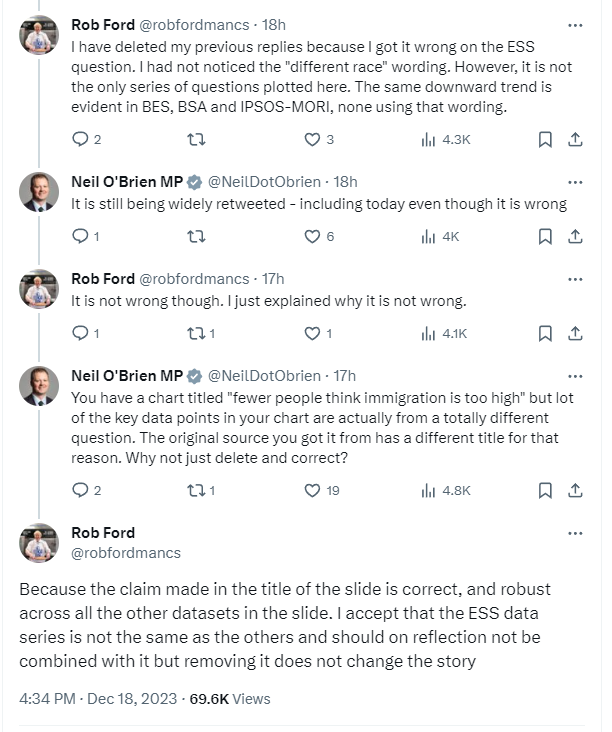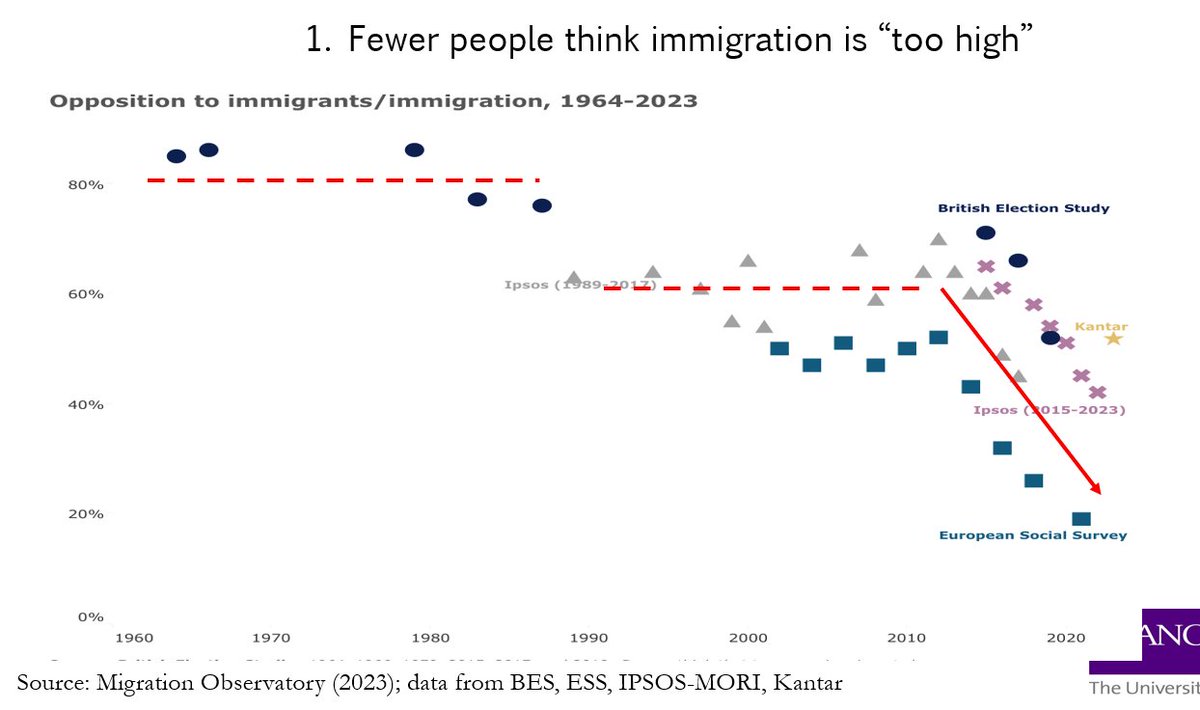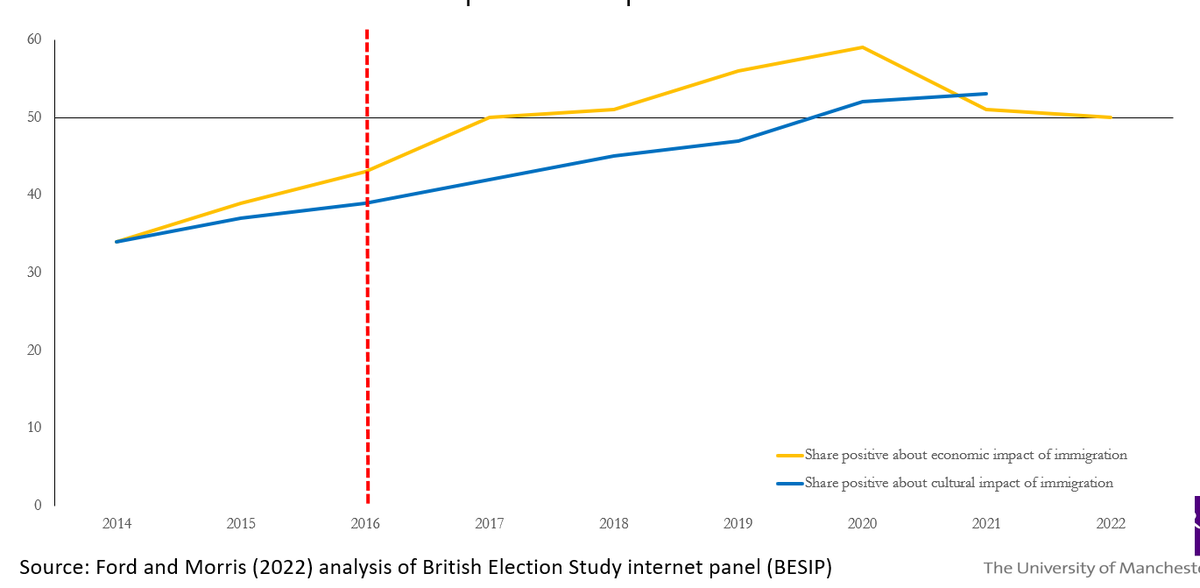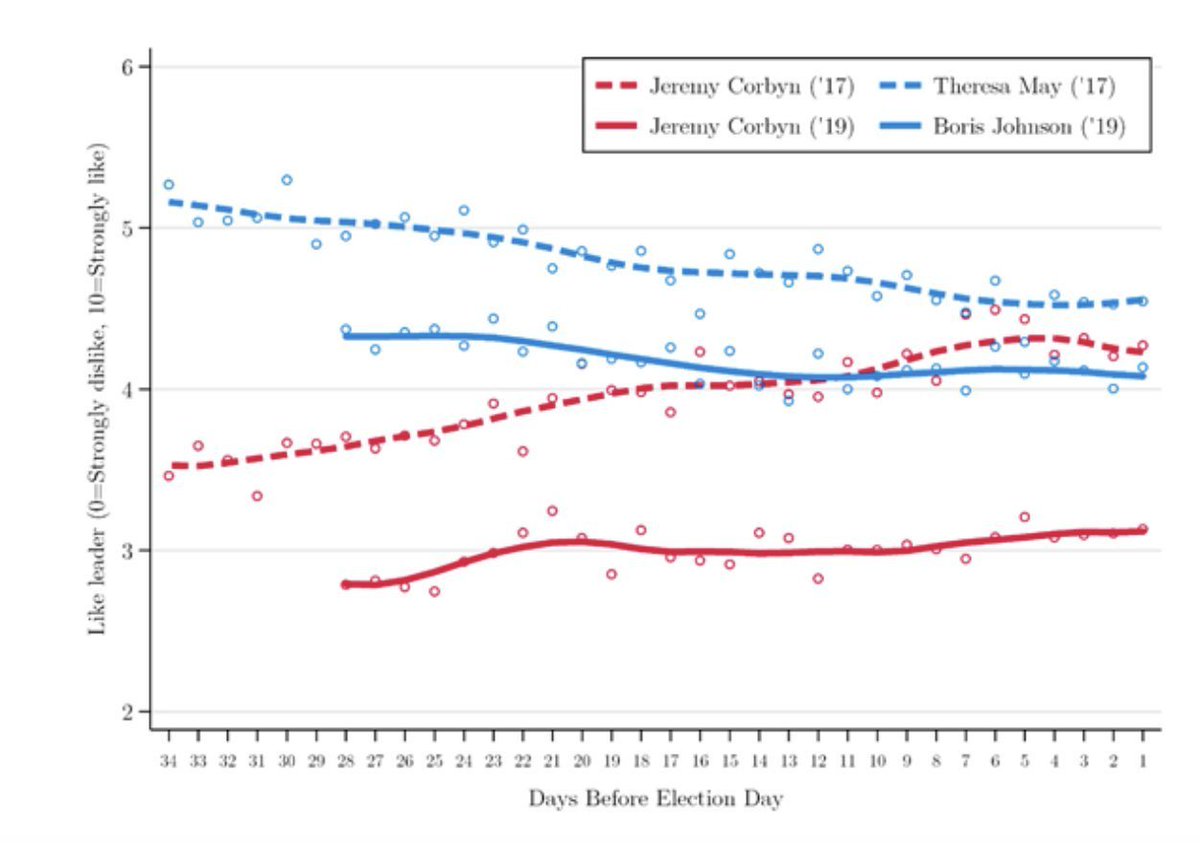OK time for the 2024 general election predictions thread now. I'm going to start with ReformUK and Nigel Farage - as predictions here have repercussions across the rest of the piece 1/?
https://twitter.com/robfordmancs/status/1740719098353631306
Will Farage return? If he does, it will certainly be to lead ReformUK election campaign - this excellent @TomMcTague piece on unusual structure of ReformUK - a company with Farage as majority shareholder - means Farage can take over any time he wants unherd.com/2023/12/nigel-…
The case for a return is clear - there's once again a market for much of Farage's product - opposition to immigration, populist raging at failed elites. Even Brexit - Farage could mobilise disaffection about it by claiming (as he regularly does) that "true Brexit" never happened due to elite incompetence and treachery
The case against? Farage would have to abandon a burgeoning media career, and would risk being blamed for Tory defeat, which might weaken his influence within the Conservatives...
...but OTOH a large ReformUK vote might convince the Cons (once again) that tacking to the populist right is the only route to recovery. In which case Farage becomes a power player once again.
Another factor is how Farage regards a potentially large Labour majority, free to pursue policies he dislikes, perhaps for two terms....
Its a hard call, and I have relatively low confidence in it (60%) but I'm going to stick my neck out and say he comes back - the lure of the limelight, his long proven ability to set the agenda and panic the Tories into adopting his ideas, a chance to influence the post-GE leadership contest - it will be enough to tempt him back.
What, then, will this mean for ReformUK in the GE. I think polls which currently have them at c.10% without Farage are probably overstating them - some of that will get squeezed back to Cons, some may be polling issues, they aren't matching this in locals
However, *with* Farage I think they can match this mark - a 10% total vote in England and Wales will be roughly halfway between UKIP's performance in E&W in 2015 (14%) and the Brexit party's performance in seats where it stood in 2019 (5.5%)
So here's the first set of GE predictions: Farage will return as leader of ReformUK, ReformUK will stand in almost all E&W seats, and will secure a total E&W vote of 10% - they'll flop in Scotland so total GB vote will be c.9%
This will mean a 8 point rise in overall support for ReformUK in 2024 vs Brexit Party in 2019 in England, and a 5 point rise in Wales. However, in seats which were already Con in 2019, the rise will be bigger because Brexit Party didn't stand candidates in any of those seats
This support is likely to draw heavily from 2019 Tory voters, particularly in seats where the Brexit party didn't stand last time. But not totally - ReformUK will also draw off some anti-incumbent votes from Labour, and will pick up a good deal of 2019 non-voters
Next up - the Greens. I expect their vote will go up, as they are a natural home for progressive leftwingers disappointed by Starmer. They've done well in locals too. OTOH, the v strong anti-incumbent mood will squeeze them in marginals, where the desire to remove Cons will be strong
I think they'll post their best ever result despite this, with 4.5% of the GB vote, with most of the big rises in big city areas with large Lab majorities. I think they'll still have one seat in Commons total - but I'm going to stick my neck out & say they'll lose Brighton Pavilion but pick up a seat somewhere else (perhaps new Bristol Central seat)
Next the LibDems - I suspect their aggregate vote won't change much, but will instead become much more efficiently distributed geographically and politically.
LDs will go up a lot where they're second, but go down a lot in Con vs Lab marginals (& other contests where they're 3rd like Lab vs SNP etc).
The loss of strongly anti-Brexit voters from 2019 will be balanced by the gain of strongly anti-Tory voters put off last time by Corbyn.
I'm going to predict no change in total LD vote - so c.12% in GB, distributed across nations in similar way to 2019 (higher in England where most of their targets now are, bit lower in Scotland where they still have some heartlands, lot lower in Wales).
LDs will go up a lot where they're second, but go down a lot in Con vs Lab marginals (& other contests where they're 3rd like Lab vs SNP etc).
The loss of strongly anti-Brexit voters from 2019 will be balanced by the gain of strongly anti-Tory voters put off last time by Corbyn.
I'm going to predict no change in total LD vote - so c.12% in GB, distributed across nations in similar way to 2019 (higher in England where most of their targets now are, bit lower in Scotland where they still have some heartlands, lot lower in Wales).
Next up SNP vs Labour in Scotland. The trendline in polling since Sturgeon's departure has been very clear - SNP sharply down, Labour rising steadily (see graph). There are good reasons to expect that to continue - Yousaf is unpopular and is a much less effective leader than Sturgeon was, scandal will continue to weaken the SNP as investigations into finance continue, the general anti-incumbent mood may mobilise voters against the SNP, who have been in charge at Holyrood even longer than the Cons have been in charge at Westminster...
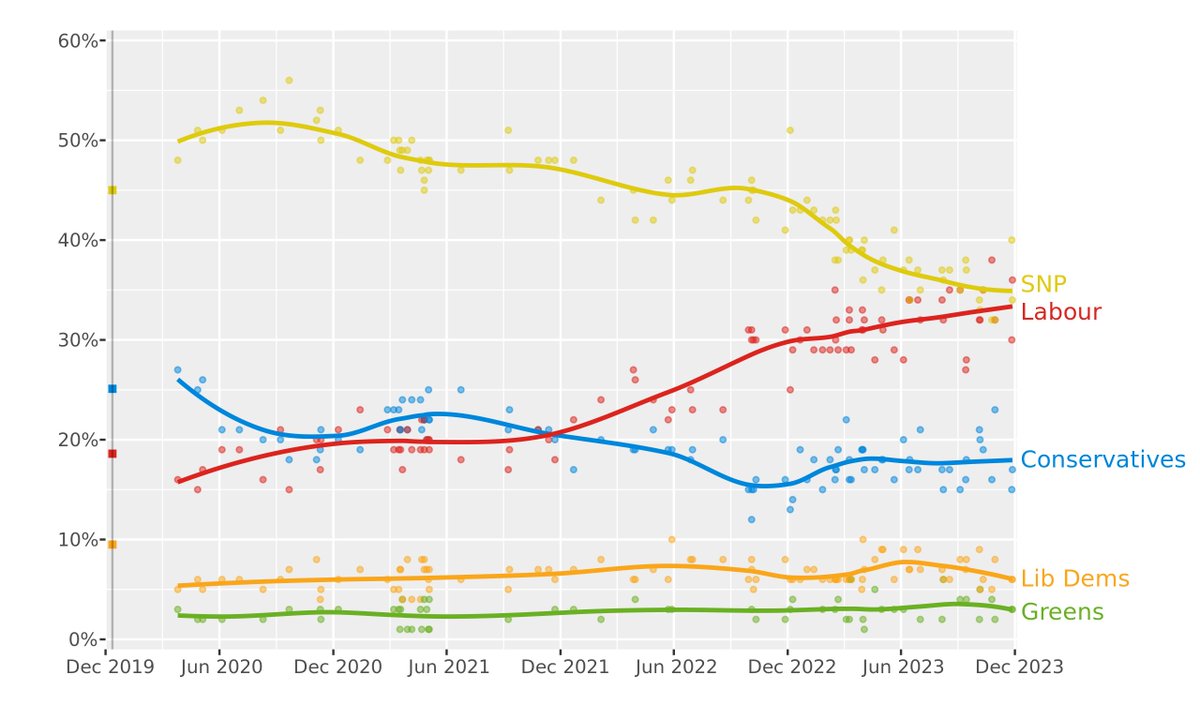
I therefore the SNP to Lab swing has further to go, and Scot Lab will overtake the SNP - Scot Lab 36% (+11) SNP 33% (-12). A uniform 11.5 point SNP to Lab swing nets Labour about 20 seat gains. I think their gain will be higher due to (a) bigger swings to Lab in historically Lab areas (b) anti-SNP/pro-union tactical voting by 3rd placed LD and Con voters in SNP-Lab seats. I predict 28 Lab gains from SNP, and LDs to regain E Dunbartonshire. No net change for Cons - while they might gain from an SNP slump, I think they'll slump further and any gains they make that way will be offset by losses elsewhere.
All of that brings us to the main event - the Con vs Lab contest in E&W. Predictions so far imply smaller total "big two" vote
LibDem24: 12 (n.c.)
ReformUK24: 10 (+8)
Greens: 4.5 (+1.7)
SNP: 3 (-1)
Plaid & other minors: 2 (+1)
Total non ConLab: 31.5
Total Con & Lab vote: 68.5
LibDem24: 12 (n.c.)
ReformUK24: 10 (+8)
Greens: 4.5 (+1.7)
SNP: 3 (-1)
Plaid & other minors: 2 (+1)
Total non ConLab: 31.5
Total Con & Lab vote: 68.5
My smaller party predictions therefore imply a return to the more fragmented pre-Brexit norm in voting - here are two party GB vote share totals since 1997:
1992: 78.0
1997: 75.9
2001: 74.7
2005: 69.4
2010: 66.7
2015: 69.0
2017: 84.5
2019: 77.7
2024 (prediction): 68.5
1992: 78.0
1997: 75.9
2001: 74.7
2005: 69.4
2010: 66.7
2015: 69.0
2017: 84.5
2019: 77.7
2024 (prediction): 68.5
That feels right to me for a number of reasons. The unifying force of Brexit is gone, so the LR trend towards fragmentation should reassert itself. Electoral geography will encourage large tactical anti-Con voting in the many seats where Lab are out of the running. Enthusiasm for big two overall is low - voters have turned against Cons but not fallen in love with Lab. Salience of imm & return of Farage will push up Reform on right fringe, salience of climate change will push up Greens on left fringe.
68.5 would be bang in line with the level of big two voting in 2005-15, before the Brexit shock to the system.
68.5 would be bang in line with the level of big two voting in 2005-15, before the Brexit shock to the system.
The current polling is also broadly in this range. For example, Con 25 Lab 43.5 would combine to exactly 68.5. A lot of recent polls look close to that. Do I expect no change between now and election day then?
No - I think the result will be a bit closer than this. Farage return will prevent Cons squeezing back votes from ReformUK, but I think Cons will recover some votes from Lab due to better economy and some DKs will come back into the fold. 43.5 Lab would be close to Blair's 1997 showing. That feels a bit high - Blair in late 1990s was by some margin the most popular leader of either party in polling history. As mentioned, I think Lab will leak some votes to Greens on left flank.
So I'm going to go Con 28 Lab 40.5. That completes the GB vote share predictions, as follows:
Lab 40.5 (+7.5)
Con 28 (-16.7)
LD 12 (n.c.)
ReformUK 10 (+8)
Greens 4.5 (+1.7)
SNP 3 (-1)
PC/Oth 2 (+1)
Lab 40.5 (+7.5)
Con 28 (-16.7)
LD 12 (n.c.)
ReformUK 10 (+8)
Greens 4.5 (+1.7)
SNP 3 (-1)
PC/Oth 2 (+1)
This would be a 12 point Con to Lab swing, larger than Blair achieved in 1997. The 16.7 point Con decline would be largest ever vote share slump, beating 2015 LD record. But Lab's vote increase of 7.5 points would be less than Blair in 1997, Attlee in 1945...or Corbyn in 2017
What would this mean in seat terms?Much depends on the pattern of tactical voting, as we can see by using @benwansell 's excellent election simulator ()
I will adjust results to reflect my Scotland prediction, which Ben's app doesn't calculate separatelylivedataoxford.shinyapps.io/GE24Simulator/
I will adjust results to reflect my Scotland prediction, which Ben's app doesn't calculate separatelylivedataoxford.shinyapps.io/GE24Simulator/
If we assume zero tactical voting, then we get (roughly) Lab 351 Con 221 LD 34 SNP 18 - Lab majority of 52.
If a quarter of Lab, LD and Grn vote tactically for the strongest local candidate we get: Lab 360 Con 204 LD 44 SNP 18 - Lab majority of 70
If half of Lab, LD and Grn vote tactically we get: Lab 370 Con 181 LD 57 SNP 18 - Lab majority of 90
If a quarter of Lab, LD and Grn vote tactically for the strongest local candidate we get: Lab 360 Con 204 LD 44 SNP 18 - Lab majority of 70
If half of Lab, LD and Grn vote tactically we get: Lab 370 Con 181 LD 57 SNP 18 - Lab majority of 90
@benwansell With these vote shares, Labour are thus highly likely to have a substantial majority, but tactical voting could make the majority larger. But I also think there are two other factors, not in Ben's model, which will push Labour's seat haul up further
Firstly, Ben's model assumes uniform swing, but there are now good reasons to think the swing may not be uniform. In recent local elections, Cons have done worse in the places they start strongest - a proportional swing pattern - see e.g. this article by @StephenDFisher prospectmagazine.co.uk/politics/61357…
Secondly, I *think* @benwansell 's model distributes extra ReformUK votes uniformly across seats. But it is very likely ReformUK will do better - and Cons worse in the Con seats (most of them) where the Brexit party didn't stand in 2019
If we assume 50% tactical voting, there are about 50 E&W seats where Ben's model spits out a Con majority of 5 points or less - if we assume that proportional swing and/or higher ReformUK votes flips half of these to the 2nd place party we get the following:
Lab: 388
Cons: 156
LD: 64
SNP: 18
Lab majority of 126
Lab: 388
Cons: 156
LD: 64
SNP: 18
Lab majority of 126
I should make clear that this is a very basic, back of the envelope type calculation. Its not very sophisticated, and it comes with heavy caveats! These are all guesstimates not a fully worked through model.
But I think it is a useful exercise in the broader context of making clear predictions, clearly explained. I've worked through each of the elements in the election in principle and then seen what comes out.
Each link in the chain seems to me plausible and/or grounded in the evidence we have: Farage returning, ReformUK doing well if he does, a strong Green vote, a big SNP to Lab swing, high tactical voting, some proportional swing, and stronger Reform UK performances where the Brexit party didn't stand last time.
Based on all of those things happening, and using Ben's seat modeller plus my own hand adjustments (again, a very basic approach! Better modelling strategies are available), this is my seat prediction:
Lab: 388 Cons: 156 LD: 64 SNP: 18 Lab majority of 126
Lab: 388 Cons: 156 LD: 64 SNP: 18 Lab majority of 126
Its a bold prediction & will v probably be wrong! I'd be very surprised if every link in the chain came out as expected. But I'd still rather have a detailed wrong prediction than a vague right one - as it will be easier then to figure out what I got wrong in my prediction & why
Anyway, I hope this has been a useful thought experiment. I'll add on some answers to specific election prediction Qs later on this thread.
Let me know in replies which bits you think I've got wrong, and why!
Let me know in replies which bits you think I've got wrong, and why!
• • •
Missing some Tweet in this thread? You can try to
force a refresh


